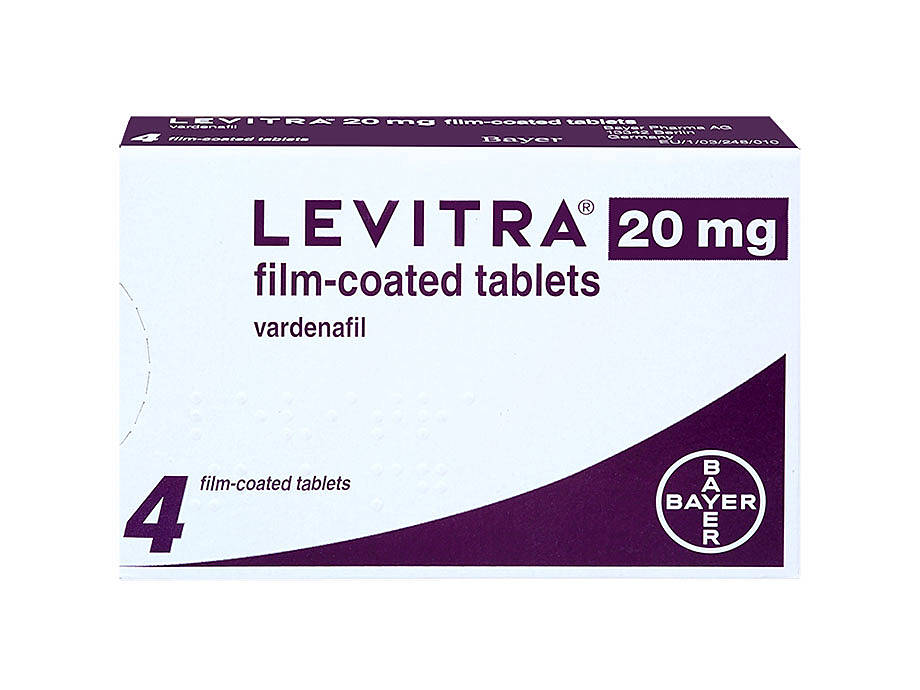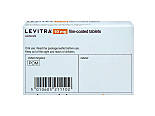Levitra
Order Consultation for Erectile Dysfunction Treatment








Levitra is an erectile dysfunction medication which contains the active ingredient Vardenafil. It needs to be taken half an hour before sex. The effect of Levitra lasts for 5-8 hours.
To place a prescription order for erectile dysfunction treatment, fill in our brief questionnaire. You can choose a preferred treatment, such as Levitra.
One of our doctors will check if the medication is suitable for you and issue your prescription to a local pharmacy in Ireland or your home address. Alternatively, you can choose to have your medication delivered directly to you.
A consultation for erectile dysfunction treatment prescription costs €21.50.



About Levitra
What is Levitra?
Levitra is a treatment for erectile dysfunction. Levitra contains Vardenafil which is a PDE-5 inhibitor, similar to Viagra. It is important to be aware that the drug cannot work when used entirely on its own, but only with sexual stimulation.
What causes erectile dysfunction?
Erectile dysfunction (ED) is caused by physical and/or psychological factors.
Physically, too little blood flowing into the penis can result in ED. Therefore, any cardiovascular problems (damage to vessels from diabetes, high blood pressure and high cholesterol) that changes blood circulation around the body, can result in ED.
Psychological causes of ED can include stress, depression, anxiety/performance anxiety, fatigue or relationship issues.
What does Levitra do?
Levitra is used to treat erectile dysfunction. ED is caused by physical and/or psychological factors.
Physically, too little blood flowing into the penis can result in ED. Therefore, any cardiovascular problems (damage to vessels from diabetes, high blood pressure and high cholesterol) that change blood circulation around the body, can result in ED.
Psychological causes of ED can include stress, depression, anxiety/performance anxiety, fatigue or relationship issues.
How does Levitra work?
Levitra increases blood flow into the penis causing an erection. An erection requires a good supply of blood, which happens when the walls of blood vessels are relaxed. A chemical known as cyclic GMP (cGMP) acts to relax blood vessel walls. cGMP exists naturally in the body but can sometimes be broken down by phosphodiesterase (PDE) enzymes. A PDE inhibitor like Levitra temporarily prevents PDE from doing its job and therefore cGMP level rises and keeps blood vessels relaxed and open to maximise blood flow.
What are the myths about what Levitra does?
Levitra will not increase a man’s sex drive but will help him get an erection when he is sexually stimulated. It is important to note that Levitra is not a contraceptive and does not protect partners from STIs (sexually transmitted infections), so it is important to use birth control and/or a condom to prevent passing on STIs.
Should I take more Levitra if I don't get results?
Do not take more Levitra than your prescribed dosage. You should not be taking Levitra more than once a day. Do not take an alternative treatment such as Viagra or Cialis within 24 hours of taking Levitra. The best solution is to consult your doctor if you don’t think the treatment is working as it should. They may be able to increase the dosage or suggest an alternative treatment.
What is the difference between Levitra and Cialis?
Levitra and Cialis are two different types of erectile dysfunction medications. Both work by relaxing the blood vessels, and increasing blood flow to the penis. This, alongside sexual stimulation, helps to produce a strong erection. Different types of ED medications will work differently for different people.
The main difference between Levitra and Cialis is that Cialis lasts longer (up to 36 hours). Many men prefer to use Cialis because of this, and because it involves less planning.
However, the downside is that the side effects of Cialis will also last longer. Men who find the side effects of their ED medication unpleasant may not enjoy taking Cialis.
Can I take Levitra if I have diabetes?
You can still take Levitra if you have diabetes. Levitra has been proven to be effective in people who have diabetes. Speak to your doctor for more information and always tell them your full medical history when being prescribed medication for ED.
Who can take Levitra?
Levitra can be prescribed for anyone over 18 years old. Nevertheless, it is still important to consult a doctor about ED so they examine the underlying causes of your disorder. In older men, these tend to be physical, but in younger men, causes are often psychological. Medications you are taking and your physical condition may affect whether or not you can take Levitra safely.
How much Levitra can I take?
Levitra is sold in tablet form in daily doses of 5mg, 10mg and 20mg taken once a day maximum. The correct dosage for an individual will be recommended by the doctor, but 10mg is the typical starting dose. Your dosage will depend on your tolerance for the main ingredient and how effective that dosage is on your ED. 10mg is a large enough dose to produce a significant result, but minimise side effects. If the medication isn't working well, consult your doctor, who will be able to increase your dose or suggest other options.
What if my medication doesn't work the first time I use it?
You may just be extra nervous because you feel more pressure to get an erection now you are on medication for your ED. It’s usually a good idea to try it a few times before deciding it doesn’t work for you.
What should my Levitra pills look like?
Levitra pills should be round and orange, with the markings “BAYER” with the dosage quoted on the other side of the tablet.
Levitra can't be taken:
- By women of any age, or men under 18
- If you are allergic to Vardenafil (experience rash, swelling of the face and eyelids, itching, difficulty breathing)
- If you suffer from hypotension (low blood pressure)
- If you have recently suffered a heart attack or stroke
- If you’re on some medications for hypertension (high blood pressure)
- If you suffer severe heart, liver or kidney problems
- If you are undergoing kidney dialysis
- If you have a family history of inherited eye degeneration (e.g. retinitis pigmentosa)
- If you have ever lost vision due to optic nerve damage caused by insufficient blood supply (non-arteritic anterior ischaemic optic neuropathy (NAION))
- If you are taking other treatments for ED
- If you are taking nitrates (e.g. glycerol trinitrate for angina relief)
- If you are taking nitric oxide donors (e.g. “poppers”)
You should tell your GP if:
- You have sickle cell anaemia
- You have myeloma (cancer of the bone marrow)
- You have leukaemia (cancer of the blood cells)
- You have haemophilia or a clotting disorder
- You're using alpha-blockers (high blood pressure treatment)
- You're taking protease inhibitors for HIV (e.g. Ritonavir or Indinavir)
- You're using Ketoconazole or Itraconazole antifungal medicines
- You're taking medicines for arrhythmia (Quinidine, Procainamide, Amiodarone or Sotalol)
- You're using Erythromycin, Clarithromycin or Macrolide antibiotics
- You have a penis deformity or Peyronie's disease
- You have stomach ulcers
- You have heart, kidney or liver problems
If you have any of the conditions above, this does not automatically mean you cannot take Levitra. It is just important that your GP knows about any conditions you may have to make sure you are taking the safest and most effective treatment.
Seek medical assistance immediately if:
- your erection lasts for over 4 hours (priapism)
- you experience sudden vision loss
- you have chest pains after intercourse (do not use any nitrate medication to treat this)
It's important you don't drive or operate machinery while taking Levitra.
When should I take Levitra and how long can it last?
Levitra takes about 30 minutes to an hour to start working. You should take Levitra a minimum of 30 minutes before sex. The effects of Levitra should last around 4 hours, similar to Viagra. You will not have an erection for this whole time, but you will be more responsive to sexual stimulation during this four-hour period. If your erection lasts for over four hours, seek medical attention immediately.
How do I take Levitra?
You can take Levitra if you've just eaten, but this may delay the drug's effects. Levitra should not be taken with grapefruit juice and should be stored at room temperature.
Levitra 10mg is taken by placing the tablet on your tongue, where it will dissolve and then you'll need to swallow it (without using any liquid drink).
Can I drink alcohol while using Levitra?
Levitra is not affected by moderate alcohol intake, but alcohol can make it more difficult for you to get an erection. You should particularly avoid alcohol if you suspect that cardiovascular problems are the underlying causes of your ED, as alcohol can aggravate such problems.
Levitra side effects
Levitra acts on the whole body, not just the penis. This can result in an increased blood flow rate around the body, causing side effects.
About 1 in 10 patients will experience flushing and headaches.
Up to 10% of users will experience an upset stomach or indigestion, dizziness, nasal congestion and nausea.
Skin rash, facial swelling, skin which is sensitive to sunlight, blurred vision, bloodshot eyes, eye pain, nosebleeds, back pain, rapid heartbeat, muscle pain, high blood pressure, low blood pressure and breathlessness may be experienced by 1 to 10 users in 1000.
Rare side effects include fainting, prolonged erection (priapism), allergic reaction, chest pains, anxiety, throat swelling, temporary memory loss, muscle stiffness, seizure and increased pressure in the eyes.

Dr Nicholas Antonakopoulos graduated from the University of London in 2006. He did his postgraduate training in hospitals in the London area, and he trained for four years in Trauma and Orthopaedic Surgery before completing his training in General practice in 2015.
Meet our doctorsLast reviewed: 27 Feb 2019
